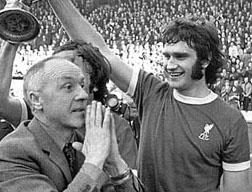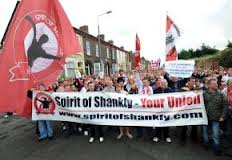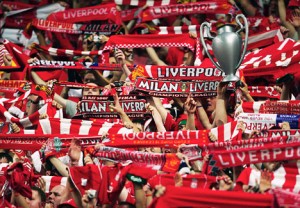By Si Steers.
There cannot be many football clubs with a more complex cultural fabric than Liverpool FC. In many ways the club represents more than football: it is an institution with a deep rooted socialist core that reflects the people of the City. Mes que un club indeed.
Without doubt it was Bill Shankly who was the architect of the club’s modern day identity; tapping into the culture of the city and using those values to create a dynasty and a blueprint that set the club on a unique journey to a formula few other football clubs in the world can boast.
So much about modern football flies in the face of what Shankly’s Liverpool stood for. The introduction of the Premier League and the cash influx of Sky money have transformed what used to be a working man’s game into a capitalist product. The days where football used to be about community and social responsibility have been diluted into an afterthought: those ideals are no longer at the heart of today’s English game.
The difficulty with modern football is that clubs are finding it increasingly difficult to retain a local identity against the backdrop of commercial pressures and competitiveness. For a club to compete in today’s game it is impossible to achieve without major investment. In recent years the demographic of support has probably changed beyond recognition, as any club that competes in the Premier League has to look beyond the local area for new supporters. The term ‘global fan base’ has become the holy grail for football clubs.
Identity
All of this poses a problem for clubs in retaining a local link with supporters, but perhaps more so for Liverpool than any other club in England. The identity of Liverpool FC has always been something that is sacred to the grass root (traditionalist) supporters. Scousers have always been receptive to a global fan base, but with the caveat that whilst where you live isn’t an issue, respecting the values and traditions of the club most definitely is.
It is the belief of the grass roots support that they own the identity of the club: preserving Shankly’s legacy. The creation of Spirit of Shankly (SOS) during the poisonous reign of Hicks and Gillett gave that group a formal voice. The fact SOS is a Union and not a ‘supporter group’ also reflects the socialist instincts of the grass roots support.
SOS’s voice isn’t reflective of the club’s global fan base, or seek to be – but it is a hugely influential voice in Liverpool. SOS was created to rid the club of owners that took the club to the brink of administration. The campaign against Hicks and Gillett was fought on a battleground between two distinct entities: ‘The Club’ and ‘The Supporters’.
That dividing line was a huge factor in ridding the club of the previous owners. But the dividing line that was needed during that process has become in some ways a broader battle line in the fight against the system, of which Liverpool FC is a part.
Football without supporters is nothing
The ‘football without supporters is nothing’ campaign led by groups like the Spirit of Shankly has the objective of putting the voice of supporters back at the heart of the game. It is a brilliant concept and an attempt to redress the balance of a game that is in danger of losing its soul.
It is no surprise to see that it is Liverpool supporters at the heart of the movement against modern football. The game has increasingly lost sight of supporters in the race to make money. Clubs either fall in line or stagnate/digress.
Taking a stand against the system will send out a message to all clubs that supporters have had enough. One objective of groups like SOS should be to mobilise similar groups at other clubs across the country to give supporters a collective voice.
It is only then that the clubs will begin to listen. It is also important to lobby the Premier League and Football Association to listen and react to supporter concerns. Both organisations are the vehicles for affecting change at the heart of the game.
The biggest difficulty with affecting change is that the Premier League is a global product that generates a huge amount of money. Change might mean revisiting the constitution of the league and finding ways to incorporate a supporter charter that gives fans a formal voice. If that is in conflict with the commercial objectives of the league and clubs then it is unlikely to bear fruit.
In an ideal world the model of the Bundesliga is something we could slowly introduce in England. Whilst nothing is perfect, the Germans have the closest formula to finding the right balance between supporter interests and commercial pressures.
Ticket Prices
The current hot topic at Liverpool is an increase in ticket prices at Anfield and the introduction of a new ‘tiered’ ticket pricing structure. Pricing ordinary supporters out of the game has become a huge issue in the game – but it isn’t unique to Liverpool. Whilst regional variations in ticket pricing influence pricing structures (e.g. London clubs charge more than those in the rest of the country), supply and demand is always going to be the driver behind pricing.
 For those clubs that sell out stadiums week in week out and have a big season ticket waiting list, the pricing of tickets will be a consideration when trying to leverage all revenue streams.
For those clubs that sell out stadiums week in week out and have a big season ticket waiting list, the pricing of tickets will be a consideration when trying to leverage all revenue streams.
It is an emotive subject. The ticket price increases have further marginalised sections of the grass roots support and created more division between club and supporters. The issue hasn’t been well handled by the club who sometimes miss a trick when announcing and considering difficult decisions.
Engagement with the supporters committee is welcome: but the loudest and most influential voice in the fan base comes from within Liverpool (especially on ticket prices), and working pro-actively with SOS rather than reactively (a post-announcement meeting with Ian Ayre) may be a politically sensible move when trying to navigate difficult decisions.
One club
At some point there has to be a realisation that a ‘them’ and ‘us’ mentality is not in the interests of the club or its supporters. At the heart of Shankly’s vision was a one club mentality, where owners, players, management and supporters celebrated success and learnt from failure as a collective (and in fairness to Brendan Rodgers, a vision he is trying to recreate).
There has to be a formula that can blend the values of Liverpool Football Club with the modern game. In fact, there has to be a way that the owners can perhaps take the lead in supporter engagement and participation in a number of areas without affecting the economic model of the club.
To achieve a balance there will have to be a bit of give and take from both sides. No club can change the game in isolation, and to expect Liverpool to do so is unrealistic and misses the bigger picture of an unfair system.
Even the club we should aspire to in terms of balance, Barcelona- the original ‘mes que un club’ – have had to abandon the socially idealistic tradition of charity sponsorship on shirts to the lure of Middle Eastern money, much to the disgust of the Catalans that actually own the club. If Barcelona with the wealth, resources and structure they have that enables them to take an idealistic view have had to abandon idealism for realism, that exposes the difficulty Liverpool faces to reinvent an identity that keeps Scouse values at its core.
But it isn’t impossible. Some of the following guiding principles can perhaps help the club and grass roots support move forward as one: working within the system but taking the lead in trying to change it.
Constructive dialogue
I think that the Supporters Committee is a great concept. It isn’t something that every club has in place and it does give supporters a voice. But for it to work effectively, it has to have teeth, and it has to bring together the views of supporter groups.
I think from the club’s perspective there is a wariness to engage in constructive dialogue with the Spirit of Shankly. Rhetoric like ‘holding the club’s owners to account’ is probably a red flag to the club hierarchy. I’d like to see the club engage SOS and other supporters groups/blogs/websites (including the Supporters Committee) to talk constructively about a constitution that can drive the club forward as one.
Supporters need to understand that the club needs freedom to make decisions on direction that will not always be popular; and that not every supporter will agree with every decision.
But perhaps by creating a supporters’ charter with input from the different groups the club can create a set of principles that will better guide the relationship. This can include issues that really matter to supporters such as ticketing.
There will be occasions when the club cannot act on supporter concerns, but if they listen at an early stage and try to find a resolution then at least supporters will be part of the conversation.
At the moment it is clear that a section of the grass-roots, local support feel marginalised and detached from the club – there has to be a recognition that the club is in Liverpool and that the local support are (perhaps) the primary guardians of the identity and values of Liverpool FC, and it is Scouse culture that makes the club the institution it is.
If the club is going to move forward as one then constructive dialogue is going to be the solution.
A figurehead
One other way to give supporters a voice is to appoint a non-executive director to the board who understands supporters concerns – somebody who can operate at that level that provides a clear link with the culture and identity of the club. (Any idea who such a person might be? – Ed)
The ticketing issue
There has to be a way for the club to take a smart approach to ticketing. Having a tiered structure is probably the right way to go; and it is possibly a change with the longer term in mind. The re-development of Anfield isn’t going to come cheap, and the club is going to need a range of ticketing options for the demographic of supporters that want to go to games.
But there are options available. Why not allow supporters to stagger payments for season tickets over 10-12 months (interest free!!)? Plenty of other clubs offer this as it makes paying for a season ticket much more affordable.
There might be a very good reason for bringing forward the payment for season tickets this year; the club’s accounts hinted at a short-term cash flow issue and it maybe that the club is trying to make sure it is ready for Financial Fair Play given that they will be championing its enforcement (thanks to Dan Kennett for that observation).
But longer term, the club can take a more innovative approach to ticketing – eg perhaps bundling products such as catering or offering discounts to Season Ticket Holders for example. Getting supporters to spend more of the ‘match day budget’ inside the stadium may help to offset future ticket price increases.
There are a number of excellent points raised by the Spirit of Shankly on ticket prices; for example the stadium does need huge investment to make it fit for purpose in the modern game.
But after two decades of financial mismanagement the club has a huge amount of catching up to do – and every single penny counts.
A final thought on tickets; to keep the soul of the club intact, the match going demographic should always include a core of local supporters. Perhaps allocating a small amount of free tickets to local schools on a match by match basis will give the next generation of local supporters the opportunity to go to the games.
But it is also worth the grass roots support remembering that the club has a global fan base and fans from around the world spend the cost of a Season Ticket travelling to 2-3 games a season.
It’s a fine balance – and one where all sides of the debate have a strong case. But it will ultimately come down to supply and demand, and the club has no option but to react to the financial pressures it faces.
Fan share
The biggest move the club could make to unite supporters is to introduce a fan share scheme. This could be an affordable concept for supporters to invest in the club without a major dilution of investment. By releasing 2-5% of shares to supporters the club will be able to take a lead on supporter participation.
Summary
The bottom line is that the club doesn’t have to do anything on supporter engagement. The big clubs often see supporters as consumers these days, not stakeholders that should have a voice in the direction of the club.
But there is an opportunity for Liverpool to be bold and be different. And in fairness to the owners, the introduction of the Supporters Committee is a step in the right direction. The recent joint initiative with Standard Chartered that saw the ‘seeing is believing’ logo on the club shirts is also something that puts social responsibility and messaging ahead of the commercial machine (albeit only briefly!).
The club has also got behind a number of issues that are close to the heart of supporters in recent times. For example, by working together the club and supporters managed to push Anne Williams’ petition over the 100k mark.
There is little doubt that Liverpool Football Club is at its strongest when it is united. The club finds itself as part of a system that is broken – and until the system is fixed it has to find a way to work within it if it wants to be successful.
Supporters need to unite against the system to ensure they get a fairer deal. But the root cause isn’t your club.
There are ways that the priorities of supporters and club can unite into a single goal. Barcelona, Bayern Munich and Borussia Dortmund are all evidence of how you can fuse your values with a commercial perspective and compete at the top of the game.
It’s all about finding the right balance – and that is something that is in the best interests of both the ‘club’ and the ‘supporters’. Both entities should be striving to find it, right now.